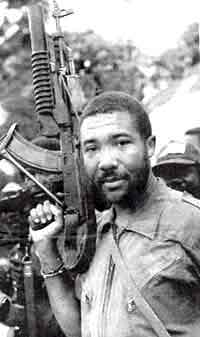Well, I’m back from 10 days of limited electricity and no hot water as an international election  observer in malaria-infected Liberia. On October 11, Liberia had their first presidential election since the ousting of President Charles Taylor, the former rebel that staged a coup d’etat of former President Samuel Doe…followed by Doe’s mutilation, torture, and murder. The U.S. and other African leaders demanded Taylor’s resignation in 2003 and he now resides in luxurious exile in Nigeria (where I observed the 2003 presidential elections).
observer in malaria-infected Liberia. On October 11, Liberia had their first presidential election since the ousting of President Charles Taylor, the former rebel that staged a coup d’etat of former President Samuel Doe…followed by Doe’s mutilation, torture, and murder. The U.S. and other African leaders demanded Taylor’s resignation in 2003 and he now resides in luxurious exile in Nigeria (where I observed the 2003 presidential elections).
None of the 22 candidates standing for election on October 11 received 50% of the vote and while California voters were considering a slew of initiatives, Liberians were choosing between an illiterate former soccer star and a highly-educated longtime public servant.
Which brings me to this writing. I really didn’t think I could find a way to make anything about this adventure California-centric, but I have. The actual election process.
Once I explain it, you will understand. Then you will scratch your head and ask yourself, "How can a war-torn, third-world country run an election with all of these mechanisms to ensure the legitimacy of the outcome and we can’t?"
Each polling location has 5 poll workers. Voters line up outside and are let in one at a time to cast their vote. As they enter, they present a voter registration card with their photo on it. This is matched against a book which lists all of the voters registered to that location accompanied by their picture.
They next stop at a table where they are presented with a ballot and the voting official stamps it to make it a legitimate ballot for the cause of the election. Yet another mechanism to avoid fraudulent ballots from being cast or boxes from being stuffed.
After the voter has voted in a private booth, much like those in the U.S., albeit made of cardboard, they insert it into a locked ballot box.
Then, another election worker swabs indelible ink on the voter’s finger to prevent them from attempting to vote in another location.
During this entire process, there are observers representing several non-governmental organizations (NGOs) as well as representatives of the political parties sitting in the polling location to ensure fairness and transparency.
Upon the closing of the polls, the poll workers count the ballots in the presence of the assembled observers preventing cheating and avoiding controversy. Each NGO that issued a report in the days following the election testified to the quality and integrity of the process administered by the transitional government.
So the question is, how can Liberia administer such a trustworthy process with so many mechanisms to insure its legitimacy and we can’t even so much as ask for an I.D. at the polling location?

